Insurance is a critical component of financial planning, offering a safety net for unforeseen events. Among the myriad of options available, life insurance and accidental death insurance emerge as two distinct types designed to offer financial protection under different circumstances. A common query, especially among younger individuals, revolves around the choice between these two types of insurance policies. This blog delves into the nuances of both, providing guidance for making informed decisions based on coverage, comprehensiveness, and long-term considerations.
Understanding the Coverage
Accidental Death Insurance
As the term implies, accidental death insurance is narrowly focused, offering coverage only if the policyholder dies due to an accident. It's important to note that such policies come with specific exclusions, such as deaths resulting from adventure sports, alcohol abuse, and self-injury, among others. The allure of accidental death insurance lies in its lower cost relative to life insurance. However, its narrow scope of coverage means that it only addresses a fraction of the potential risks one might face.
Life Insurance
In contrast, life insurance provides a broader spectrum of coverage, including natural death, illnesses, and accidents, with the only common exclusion being suicide within the first year of the policy. This comprehensive coverage ensures that beneficiaries are financially protected in a wider array of circumstances, not just accidental death.
Considering the Broader Picture
While the initial cost of accidental death insurance might seem appealing due to its lower premiums, it's essential to consider the broader spectrum of risks and the ultimate purpose of insurance — financial security for your loved ones in case of any eventuality, not just accidents.
The Case for Life Insurance
- Comprehensive Coverage: Life insurance covers a wider range of scenarios, including illness and natural causes of death, offering peace of mind that your loved ones will be protected.
- Cost-Effectiveness Over Time: For younger individuals, premiums for life insurance are significantly lower, reflecting the lower risk of natural death. Locking in these low rates early on can provide long-term financial benefits.
- Future Proofing: Life's unpredictability necessitates coverage that extends beyond accidental circumstances. Life insurance ensures that your coverage adapts to changes in your health and life circumstances.
Making the Right Choice
Choosing between life insurance and accidental death insurance should be informed by a comprehensive evaluation of your personal needs, lifestyle, and long-term financial planning goals. Here are some considerations to guide your decision:
- Assess Your Risk Profile: Consider your daily activities, health, and family history. If your lifestyle or work exposes you to higher risks, supplemental accidental death coverage could be beneficial alongside a life insurance policy.
- Evaluate Financial Goals: Think about the financial needs of your dependents. Life insurance can offer broader protection to support their future, including education and living expenses, not just in the event of accidental death.
- Consult Professionals: A financial advisor or an experienced Chartered Accountant can provide personalized advice based on your specific circumstances and help you navigate the complexities of insurance products.
Conclusion
For young individuals pondering over the choice between life insurance and accidental death insurance, the comprehensive coverage and long-term benefits of life insurance make it a cornerstone of sound financial planning. While accidental death insurance can play a role in a broader insurance strategy, it should not be viewed as a substitute for life insurance. Making an informed choice ensures that you and your loved ones are adequately protected against the full spectrum of life’s uncertainties.
